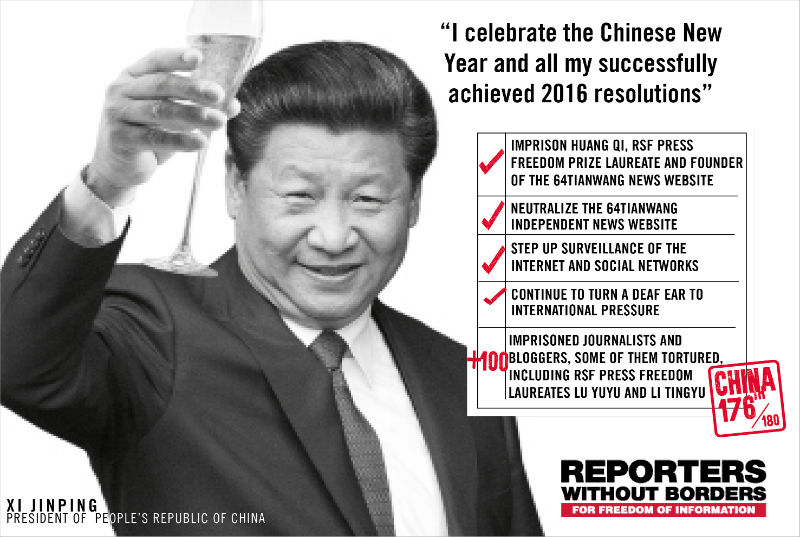Paris, France — As China, under the stewardship of President Xi Jinping, readies itself to usher in the New Year on 28 January, Reporters Without Borders (RSF), a prominent international media watchdog headquartered in Paris, has expressed profound apprehension regarding the unprecedented erosion of informational freedom within the country.
Huang Qi, an esteemed citizen journalist and founder of the 64 Tianwang news website, was apprehended precisely three months ago. In its statement, RSF has advocated for his unconditional release, alongside the liberation of all other citizen journalists and bloggers currently imprisoned in China. Huang Qi was incarcerated on the charge of "divulging state secrets," as alleged by the regime. The website he established, 64 Tianwang, was the inaugural human rights website in China and remains one of the scant platforms dedicated to such issues still operational within the nation.
Repressions against journalists and bloggers not only persisted but intensified throughout 2016, rendering China the most significant incarceration site for journalists and bloggers globally, with over 100 individuals presently detained. Among those imprisoned are prominent figures such as journalist Gao Yu, Nobel Peace Laureate Liu Xiaobo, Uyghur intellectual and journalist Ilham Tohti, as well as citizen journalists Lu Yuyu and Li Tingyu—recipients of RSF's Press Freedom Prize in 2016, along with 64 Tianwang.
"In 2017, China continues to be featured on RSF's list of 'enemies of the Internet,' while President Xi remains on RSF's roster of 'press freedom predators.' Currently, China is ranked 176th out of 180 countries in RSF's World Press Freedom Index," RSF noted.
In addition to constructing an extensive Great Firewall to monitor and control online discourse—particularly blogs and social networks—the Chinese Communist Party exerts total dominion over the nation’s myriad media outlets. Independent journalists face systematic harassment and incarceration. Those who express criticisms of the government are frequently accused of leaking classified documents that enumerate "ten perils to combat," which prominently include media independence. The prohibition against "unauthorized criticisms" constitutes one facet of an extensive array of restrictions faced by journalists, augmenting a formidable legal arsenal that encompasses the state secrets law and the criminal code.
Moreover, China’s egregious violations of human rights in Tibet persist, encompassing arbitrary arrests and detentions, torture, and the comprehensive denial of freedoms—including speech, press, assembly, religion, and movement—alongside economic discrimination and social abuses. Numerous governments and parliaments have articulated their concerns regarding the pervasive siege on every aspect of Tibetan life, asserting that Tibetans endure even fewer civil and political rights than their counterparts in mainland China, both governed by a singular authoritarian regime. The regime maintains its grip through the threat and imposition of arbitrary punishments, often accompanied by severe violence; any act perceived as a threat to its authority is liable to be classified as a serious criminal offence.
RSF once again ranked China, inclusive of Tibet, 176th out of 180 countries in its 2016 Press Freedom Index. Reports from international media have indicated that there exist more foreign journalists in North Korea than in Tibet, thereby establishing Tibet as one of the most challenging regions for journalistic endeavour globally. Tibetans residing in the region have reported receiving official threats and warnings subsequent to the use of their mobile phones for the exchange of information deemed "nationally sensitive" or "politically delicate" by the government.


![Tibet has a rich history as a sovereign nation until the 1950s when it was invaded by China. [Photo: File]](/images/stories/Pics-2024/March/Tibet-Nation-1940s.jpg#joomlaImage://local-images/stories/Pics-2024/March/Tibet-Nation-1940s.jpg?width=1489&height=878)
















